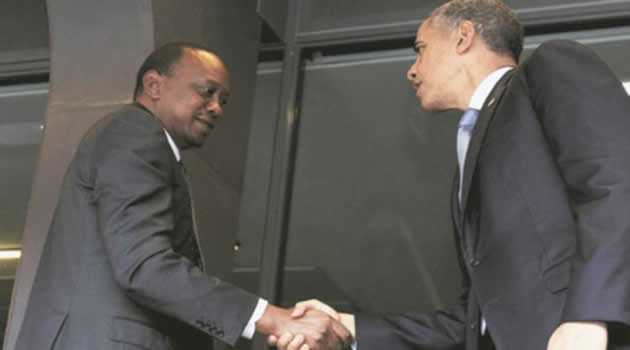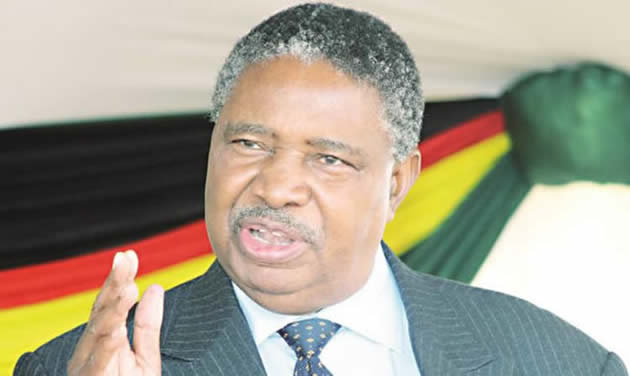When a son returns lauding homosexuality


DEFINING HANDSHAKE . . . “I think same sex couples should be able to get married,” US President Barack Obama believes, and it is this belief that is likely to illuminate his hyped visit to Kenya
The Arena With Hildegarde
THE biblical parable of the lost son (Luke 15:11-31) will be replayed later this week as Kenya welcomes United States of America President Barack Hussein Obama to his fatherland, probably the last such visit before leaving office.
The visit is raising so much excitement in the Eastern African country.
The villagers of Kogelo where his father Barack Hussein Obama (Snr) was born cannot contain their excitement with enterprising individuals cashing in by selling various paraphernalia to mark the “historic” moment. You can imagine all of them bragging: “Mwana wedu iyeye!” (That’s our son!)
An AFP report says one entrepreneur Hosea Owuor claimed the visit was “business” because “Obama is a brand”.
The village says it had President Obama to thank since it got a facelift: “When he became president that’s when we got the tarmac road and good water for drinking. This school got two classrooms, an office and a store. We got a police station. These things are coming because of him!” said one villager.
One businessman intimated, “President Obama has changed this village. In our culture we say everybody who comes to see (the president’s step-grandmother) Mama Sarah are Barack Obama’s visitors, so it is my duty as a village mate, as a cousin, to take care of his guests while he is away.”
The US leader is visiting Kenya at the height of what some analysts believe is the epitome of his presidency since he has been scoring “big” in foreign policy.
They argue that apart from being the United States’ first black president, he now has a legacy to talk about: from the Supreme Court ruling on gay marriage, to the Iran nuclear deal and then the restoration of diplomatic ties with Cuba. He is basking in joy unspeakable, and it would seem as if the homecoming is to seal what he wrote in his 1995 memoirs—Dreams From My Father. Some would translate it as a home coming to thank the ancestors in between official business.
As the visit continues to be hyped, the writer takes issue with some reports where host, Kenyan President Uhuru Kenyatta dismissed claims that gay rights would not be an issue during the Obama visit.
President Kenyatta maintained that there were more serious issues for Kenya and the United States to discuss rather than being bogged down with gay rights: “That is a non-issue to the people of this country, and it is definitely not on our agenda at all,” he reportedly said when asked.
He added, “We as a country, as a continent, are faced with much more serious issues which we would want to engage the US and all our partners with.”
At face value, this sounds quite plausible, but the flip-side is also true that the United States Supreme Court ruling on same sex marriage last month is Obama’s badge of honour. He described it as a “victory for America” adding that the US was “founded on a bedrock principle — that we are all created equal.”
To better understand why gay rights would be part of the Obama visit to his fatherland and also to Ethiopia and the African Union, you have to examine the intensity of his excitement after the June 26 ruling.
According to National Public Radio, Obama said progress on the journey to equality “comes in small increments. Sometimes two steps forward, one step back. And then sometimes there are days like this, when that slow steady effort is rewarded with justice that arrives like a thunderbolt. Today, we can say in no uncertain terms that we made our union a little more perfect,” he said.
As odd as it might sound, this visit will be the launch pad for pressing Africa further (starting with Kenya) to embrace gay rights as human rights.
The majority of African states have been labelled homophobic and living on the wrong side of history, but the message will go round that they have to “change” by decriminalising homosexuality.
To deny this fact will be failure to see that gay rights are now the carrot and stick being used by the West to grant development aid. These are rights that now transcend all other human rights.
Further context of why this will be an issue suffices. When Obama advocated gay rights away from the private meeting he had with Senegalese President Macky Sall in June 2013, he was rebuffed.
According to reports he was not deterred as he maintained: “I want the African people to just hear what I believe. . . People should be treated equally, and that’s a principle that I think applies universally.”
President Kenyatta should also remember that in 2012 Obama was called “the first gay president,” because he made gay rights and same sex marriage major issues of his campaign for his second term: “At a certain point I’ve just concluded that for me personally it is important for me to go ahead and affirm that I think same sex couples should be able to get married,” said Obama in May 2012, adding, “We don’t think the Defence of Marriage Act is constitutional,” and called for its repeal.
Thus Obama as president and politician took the lead role to redefine marriage and family, a position that resulted in the June 2015 “victory”.
Kenya is also a member of the Commonwealth and President Kenyatta recalls that at the 2011 Commonwealth Heads of Government Meeting in Perth, Australia British premier David Cameron threatened to withhold aid for African countries that do not observe gay rights.
This writer’s perception is that the subject will come up whether President Kenyatta likes it or not. You do not necessarily have to have an official agenda to raise crucial issues like this, and for the US and other Western nations gay rights are a game changer in their relations with Africa.
When it comes up, we hope that the millions of dissenting voices will be heard, including Deputy President William Ruto who condemns homosexuality.
He was not embarrassed to tell worshippers at a church that it was a sexual orientation that went against God’s plan. “We have heard that in the US they have allowed gay relations and other dirty things,” he reportedly said.
The 700 pastors who are members of the Evangelical Alliance of Kenya issued a statement recently saying they welcomed the US president’s visit to Kenya “provided he stops pressuring Kenyans to forsake their religious convictions by endorsing the homosexual lifestyle.”
“We would like to send a strong message to US president that the homosexuality debate should not become part of his agenda, as it has been his tendency whenever he comes to Africa,” said the Evangelical Alliance of Kenya leader Bishop Mark Kariuki.
Roman Catholic Church Archbishop of Nairobi, Cardinal John Njue also warned Obama: “Those people who have already ruined their society. . . let them not become our teachers to tell us where to go. I think we need to act according to our own traditions and our faiths.”
As we watch the trends on the continent since June 2015, it is evident that the US Supreme Court ruling became an indirect way of blackmailing some African governments whose budgetary allocations are supported by foreign aid. So, there is no doubt that gay rights will be an issue in Kenya and Ethiopia later this week.










Comments